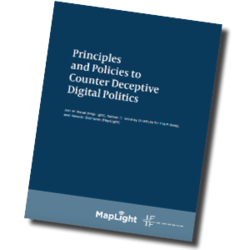Future Now
The IFTF Blog
New Policy Platform Outlines Solutions to Address Deceptive Digital Politics
A Framework from MapLight and Institute for the Future to Safeguard U.S. Elections
 A new report offering a framework of democratic principles and a comprehensive set of policies to address the spread deceptive digital politics calls for a proactive approach combining immediate policy change with long-term systemic reforms. The report, Principles and Policies to Counter Deceptive Digital Politics, is a collaboration between Ann Ravel, former Chair of the Federal Election Commission and Digital Deception Project Director at MapLight; Samuel Woolley of the Institute for the Future; and Hamsini Sridharan of MapLight.
A new report offering a framework of democratic principles and a comprehensive set of policies to address the spread deceptive digital politics calls for a proactive approach combining immediate policy change with long-term systemic reforms. The report, Principles and Policies to Counter Deceptive Digital Politics, is a collaboration between Ann Ravel, former Chair of the Federal Election Commission and Digital Deception Project Director at MapLight; Samuel Woolley of the Institute for the Future; and Hamsini Sridharan of MapLight.
The platform outlined by MapLight and IFTF spans recommendations in the areas of campaign finance; data usage and privacy; automated and fake social media accounts; global cooperation; and media and civic education, among others. The platform is divided into immediate policy proposals -- such as improving disclosure requirements for online political ads and creating a new government authority to investigate the true source of funding for digital political activity -- and systemic changes like building media literacy and civics into public education, learning from policy models around the world, and incorporating a civil rights perspective into product design.
The aftermath of the 2016 election marked a widespread recognition of the sprawling problems posed by political bots, troll farms, fake social media accounts, networks of disinformation websites, deceptive digital advertising, and other efforts to manipulate public opinion. However, policymakers in the United States have taken only minimal steps to address the underlying issues that now make political deception so pervasive online. In the report, MapLight and the Institute for the Future outline more than thirty concrete recommendations -- all grounded in the democratic principles of transparency, accountability, standards, coordination, adaptability, and inclusivity--to protect the integrity of the future elections, including the pivotal 2020 U.S. presidential election.
View the full policy platform and summary of proposals here: Principles and Policies to Counter Deceptive Digital Politics.
“Both the 2016 and 2018 elections have served as glaring reminders of the vulnerabilities in our democracy in the information age,” said Ann Ravel, former Chair of the Federal Election Commission and co-author of the report. “We cannot respond to the challenges with paralysis and inaction. We must put in place protections now to safeguard our political process.”
“There’s no magic-bullet policy that is going to automatically safeguard our elections and wind back the clock to the era before digital communication was a primary feature of political campaigning,” added Samuel Woolley, Director of the Digital Intelligence (DigIntel) Lab, Institute for the Future and report co-author. “We need our full society to be involved in responding to these problems.”
The report outlines how two features of the digital environment, anonymity and automation, have made deceptive digital politics especially harmful. To counter the challenges posed by political actors posting misleading content from false or obscured identities and the spread of misleading information via automation, MapLight and IFTF provide a rubric for evaluating policy solutions based on their effectiveness promoting the democratic principles of transparency and accountability.
The report outlines how two features of the digital environment, anonymity and automation, have made deceptive digital politics especially harmful. To counter the challenges posed by political actors posting misleading content from false or obscured identities and the spread of misleading information via automation, MapLight and IFTF provide a rubric for evaluating policy solutions based on their effectiveness promoting the democratic principles of transparency and accountability.
“It’s clear we cannot allow technology companies to simply police themselves,” said Hamsini Sridharan, Program Director at MapLight and report co-author. “We hope this platform serves as a jumping-off point for more robust regulation in the months and years ahead.”
The report is part of a new project by MapLight to examine dark digital advertising and online disinformation. The policy proposals are based on conversations with technologists, academics, and policy experts and a review of existing commentary on deceptive digital politics.
About MapLight
MapLight is a nonpartisan, nonprofit organization that reveals the influence of money in politics, informs and empowers voters, and advances reforms that promote a more responsive democracy.
About Institute for the Future
Institute for the Future is the world’s leading futures thinking organization. For over 50 years, businesses, governments, and social impact organizations have depended upon IFTF global forecasts, custom research, and foresight training to navigate complex change and develop world-ready strategies. IFTF methodologies and toolsets yield coherent views of transformative possibilities across all sectors that together support a more sustainable future. Institute for the Future is a registered 501(c)(3) nonprofit organization based in Palo Alto, California.



